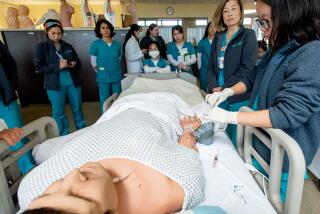Dont knock biblical home ec
As the Los Angeles Times recently reported, undergraduates at Southwestern Baptist Theological Seminary now have the opportunity to concentrate in homemaking within the humanities major. For women only, the concentration teaches cookie-baking, conversation-starting, child-raising, husband-supporting and the patriarchal theology that makes each of those tasks fulfilling.
As an undergraduate anthropology major at a Christian liberal arts college, I once asked a droll professor what I could do with my major. He answered, “Pump gas in a cross-cultural gas station.”A homemaking concentration, on the other hand, has a clear outcome: Women are prepared to be wives, mothers and home-schoolers. At 20, I put down my domesticity-focused peers women should get out of the kitchen and change the world! Now an anthropology professor, wife and mother of three rambunctious boys, I’m still glad I majored in anthropology, but maybe I should have minored in homemaking. At 20, I overplayed the importance of achieving parity with men in the public sphere and underestimated the world-changing dimensions of being a good wife and mother.
If college should shape young adults who will positively influence society, then a homemaking concentration is timely. The family is among the neediest social institutions. Even liberal arts colleges offer courses in family studies, though these are heavier on science and theory and lighter on prescriptive theology. I think Southwestern’s academic program is, in part, an aggressive strategy on the part of seminary and denominational leadership, but considering that there are 16 million Southern Baptists, it stands to influence millions of Americans.
When I first read course titles such as “Biblical Model for Home and Family” and “Homemaking Practicum,” I thought the program was ridiculous. On second thought, however, my unsolicited advice to Southwestern’s curriculum committee is not to abandon a homemaking curriculum, but to go even further.
First, teach money: thrifty shopping, of course, but also purchasing a home, doing taxes and investing. A financial course could also teach women how to guide their husbands gently toward wise financial stewardship, which would contribute to a good outcome without violating patriarchy. (Even if men took a course in finances, 50% of them would be in the bottom half of the class and could use their wives’ support.) Finances and sex are two taboos insufficiently addressed in families or communities, and they warrant classroom instruction.
Second, the curriculum should include advanced topics related to the absence of men. “Cheating, Leaving, Dying: What To Do When He’s Gone” would cover most of what I have in mind. Reserved for the 400-level is “On Your Own Two Feet or By Your Man: Where to Stand,” in which women discuss strategies for coping with sexual addiction, gay husbands, straight affairs and financial scandal. Another is “Why the Bleep Am I Still Single?” Most homemaking students will be anticipating a future of mothering, wifing and home-schooling, but some will not marry, and some of those married will not parent.
Third, there ought to be study for men, beyond a course in the theology of patriarchy. A few essentials: “Basic Home Repair,” “Achieving Financial Stability” and “Being a Song of Solomon Lover.” Perhaps egalitarians and complementarians can agree that women deserve satisfaction in things financial, sexual and electrical.
I enjoy my female undergraduates who, like myself at their age, are exploring radical ways to work for justice, eschewing makeup and high heels as they go. A good number of their peers are working on their MRS degrees, though, and I also bless their journeys. In addition to helping her find ways to improve the world with her gifts, a liberal arts education prepares a Christian woman to make discerning choices about the power dynamics of her household. As a mom, she can read peer-reviewed research to her children while they bathe, contemplate Aristotelian spirituality while doing dishes (truth in the immanent) and remember that whether her hands bless the many in public service or the one, two or three in the highchairs, it is love that changes the world.
Jenell Williams Paris is a professor of anthropology and sociology at Messiah College in Grantham, Pa.
Send us your thoughts at opinionla@latimes.com.
More to Read
A cure for the common opinion
Get thought-provoking perspectives with our weekly newsletter.
You may occasionally receive promotional content from the Los Angeles Times.










